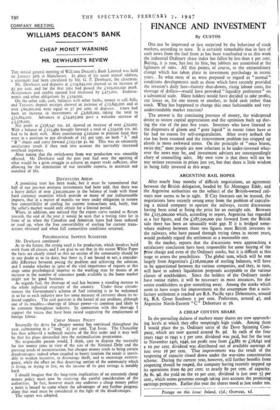FINANCE AND INVESTMENT
By CUSTOS One can be impressed or just surprised by the behaviour of stock markets, according to taste. It is certainly remarkable that in face of such news from the fuel front as has been vouchsafed to us this week the industrial Ordinary share index has fallen by less than I per cent. Buying, it is true, has lost its bite, but jobbers are astonished at the lightness of sales. All this points, of course, to the extraordinary change which has taken place in investment psychology in recent years. . In what most of us were prepared to regard as "normal" conditions developments such as those which have recently provided the investor's daily fare—factory shut-downs, rising labour costs, the shortage of dollars—would have provoked "liquidity preference" on a substantial scale. Many holders would have decided to take profits, cut losses or, for one reason or another, to hold cash rather than stock. What has happened to change this once fashionable and very understandable market reaction?
The answer is the continuing pressure of money, the widespread desire to secure capital appreciation and the optimism built up dur- ing the rise of the past five years. Investors who have listened to the dispensers of gloom and "gone liquid" in recent times have so far had no reason for self-congratulation. After every setback the rise has been resumed and the reinvestment problem has cropped up afresh in more awkward terms. On the principle of "once bitten, twice shy," most people are now reluctant to be under-invested what- ever the news may be, and investment advisers are correspondingly chary of counselling sales. My own view is that there will not be any serious recession in prices just yet, but that there is little wisdom in being fully invested at this stage.
ARGENTINE RAIL HOPES After nearly four months of difficult negotiations, an agreement between the British delegation, headed by Sir Montague Eddy, and the Argentine authorities on the subject -of the British-owned rail- ways now seems to be in sight. If City forecasts can be trusted, the negotiations have recently swung away from the problem of capitalis- ing a mixed company to operate the railways, recent discussions having been aimd at fixing the price for an outright sale. Between the £125,000,000 which, according to report, Argentina has regarded as a fair figure, and the L187,5oo,000 put forward from the •British side there has been an unusually wide gap. If it is bridged some- where midway between these two figures most British investors in the railways, who have passed through trying times in recent years, would probably regard the settlement as a reasonable one.
In the market, reports that the discussions were approaching a satisfactory conclusion have been responsible for some buying of the prior charge and even of the Ordinary stocks, but it is difficult at this stage to assess the possibilities. The global sum, which will be met largely from Argentina's £126,000,000 of sterling balances, will have to be apportioned between the various companies, and they, in turn, will have to submit liquidation proposals acceptable to the various classes of stockholders. Since the holders of the Ordinary stocks have voting rights, it will be necessary in most instances, for the senior stockholders to give something away. Among the stocks which seem to have scope for improvement on the assumption that a satis- factory settlement is reached are BA. Pacific 1912 Debentures, around 63, B.A. Great Southern 5 per cent. Preference, around 47, and Argentine North-Eastern " C " Debenture at 56.
A CHEAP COTTON SHARE
In the prevailing dulness of markets many shares are now approach- ing levels at which they offer temptingly high yields. Among them I would place the 5s. Ordinary units of the Dove Spinning Com- pany, which are now quoted around 8s. 9d. In each of the four years 1942 to 1945 a 5 per cent. dividend was paid, but for the year to November 24th, 1946, net profit rose from £4,881 to L16,642 and a Jo per cent, dividend was distributed out of available earnings of just over 16 per cent. That improvement was the result of the reopening of capacity closed down under the war-time concentration scheme. During the current year, however, still further benefits from reopening should be reaped, the company having recently stepped up its operations from 6o per cent, to nearly 8o per cent. of capacity. At 8s. 9d. the yield on the to per cent, dividend is just over 5f per cent., which seems generous enough taking into account the promising earnings prospects. Earlier this year the shares stood at just under Jos.


































 Previous page
Previous page